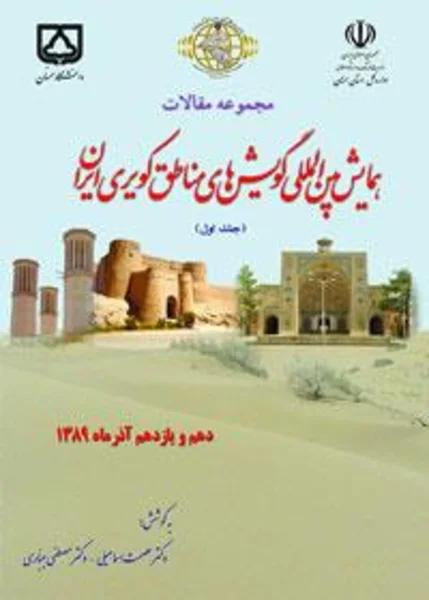-
a comparison among aspect markers in balochi dialects of turkmenistan, afghanistan, sistani sarhadi, granchin sarhadi, sarawani, and koroshi
جزئیات بیشتر مقاله- تاریخ ارائه: 1389/01/01
- تاریخ انتشار در تی پی بین: 1389/01/01
- تعداد بازدید: 940
- تعداد پرسش و پاسخ ها: 0
- شماره تماس دبیرخانه رویداد: -
the present study is a comparison among aspect markers in balochi dialects spoken in turkmenistan, afghanistan, sistan (sarhadi), granchin (sarhadi), sarawan, and fars (koroshi balochi). the theoretical models used are comrie (1976, 1985) and bhat.(1999). the oral texts used as language data, which made up the corpus for analysing aspect markers in koroshi, were collected from different parts of fars province during several field journeys in the period between february 2008 to april 2009 and the oral texts used as language data for analysing aspect markers in sistani balochi were collected from different parts of sistan during several field journeys in the period between february 2009 to may 2010. the main part of the material consists of folktales, life stories and procedural texts (how to cook, how to weave, etc.) told by male and female linguistic consultants (20 persons) of different ages (between the ages of 40 and 90) with different social backgrounds. after recording the linguistic data (in wav format), the texts were reduced to written form by means of a phonological transcription. language data and examples for this aim for other dialects were extracted from published papers and books. there are two aspects in all the dialects mentioned: perfective (unmarked) and imperfective (marked), and the verbal clitics = a and marginally k= markers of imperfective aspect. it is, however, very interesting to note that in koroshi balochi dialect there is a different structure in addition to the verbal clitic =a (which also appears attached to the verb as a proclitic a= in koroshi) which also shows imperfective aspect, namely a construction with ma-). both these constructions are parallel. in the present temporal field, koroshi shows a structure for progressive aspect that is not found in any other dialects of balochi studied so far except in koroshi and lashari balochi (yusefian 1382). in some of the dialects studied in this research such as sistani balochi and balochi of granchin there are two different structures in imperfective progressive/ingressive aspect both in the past and present temporal field, which are used side by side by consultants. the second structure shows the influence of persian. in sarawani dialect there is one structure indicating imperfective progressive/ingressive aspect, which also shows the influence of persian but in balochi of turkmenistan and afghanistan there is only the inherent balochi structure for this aspect. perfective aspect in all these dialects is unmarked and is formed with the past stem plus personal endings or agent clitics.
مقالات جدیدترین رویدادها
-
استفاده از تحلیل اهمیت-عملکرد در ارائه الگوی مدیریت خلاقیت سازمانی و ارائه راهکار جهت بهبود
-
بررسی تاثیر ارزش وجوه نقد مازاد بر ساختار سرمایه شرکت های پذیرفته شده در بورس اوراق بهادار تهران
-
بررسی تأثیر سطح افشای ریسک بر قرارداد بدهی شرکت های پذیرفته شده در بورس اوراق بهادار تهران
-
بررسی تأثیر رتبه بندی اعتباری مبتنی بر مدل امتیاز بازار نوظهور بر نقد شوندگی سهام با تأکید بر خصوصی سازی شرکت ها
-
تأثیر آمیخته بازاریابی پوشاک ایرانی بر تصویر ذهنی مشتری پوشاک ایرانی (هاکوپیان)
-
بررسی تغییر اندازه سنگ دانه ها بر روی خواص رئولوژیکی و مکانیکی بتن خود تراکم سبک ساخته شده با پوکه معدنی
-
شهرسازی و توسعه ناپایدار شهری؛ مطالعه موردی متروپل تبریز
-
بررسی مدلهای موجود برای هدایت حرارتی و ویسکوزیته در نانوسیال ها
-
بررسی آسیب شناسی آموزش مجازی درس علوم در دوره پیش دبستانی از منظر مربیان شهر میاندوآب
-
biosynthesis of benzoylformic acid from benzoyl cyanide by a newly isolated rhodococcus sp. cczu10-1 in toluene–water biphasic system
مقالات جدیدترین ژورنال ها
-
مدیریت و بررسی افسردگی دانش آموزان دختر مقطع متوسطه دوم در دروان کرونا در شهرستان دزفول
-
مدیریت و بررسی خرد سیاسی در اندیشه ی فردوسی در ادب ایران
-
واکاوی و مدیریت توصیفی قلمدان(جاکلیدی)ضریح در موزه آستان قدس رضوی
-
بررسی تاثیر خلاقیت، دانش و انگیزه کارکنان بر پیشنهادات نوآورانه کارکنان ( مورد مطالعه: هتل های 3 و 4 ستاره استان کرمان)
-
بررسی تاثیر کیفیت سیستم های اطلاعاتی بر تصمیم گیری موفق در شرکتهای تولیدی استان اصفهان (مورد مطالعه: مدیران شرکتهای تولیدی استان اصفهان)
-
نقش مدیریت شهری در مناطق حاشیه نشین با تاکید بر ایران
-
مدیریت و کاهش بهای تمام شده، با محوریت طبقه بندی طبیعی هزینه ها در کسب کارهای کارآفرینانه با رویکرد ارزش آفرینی
-
فرآیند پیش نگری ، تاثیرات آن در عکاسی فتوشیمیایی و نحوه احیاء آن در عکاسی دیجیتال
-
scrutinization of the relationship between organizational agility and the application of information and communication technology in the education organization of shirvan township in the year 2015
-
investigating the seismic performance of steel moment-resisting frames by using damage index




سوال خود را در مورد این مقاله مطرح نمایید :